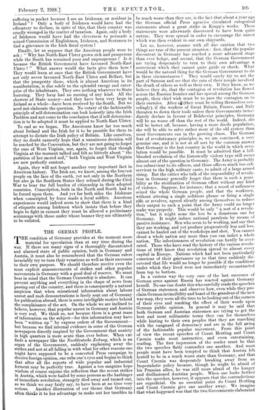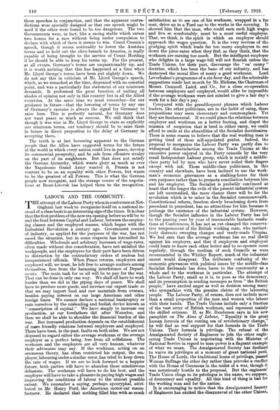THE GERMAN PEOPLE. T HE condition of Germany provides at the
moment more material for speculation than at any time during the war. If there are many signs of a thoroughly discontented and alarmed state of public opinion, both in Germany and Austria, it must also be remembered that the German rulers invariably try to turn their vexations as well as their successes to their own purpose. We should therefore receive even the most explicit announcements of strikes and other popular movements in Germany with a good deal of reserve. We must bear in mind that the German Censorship is absolute. It can prevent anything and everything in the shape of news from passing out of the country, and there is consequently a natural suspicion that when sensational information about labour unrest and mob demonstrations is freely sent out of Germany for publication abroad, there is some intelligible motive behind the complaisance of the act. On the whole we are inclined to believe, however, that popular unrest in Germany and Austria is very real. We think so, not because there is a great mass of information on the subject—for this information may have been " written up " by express orders of the Government— but because we find internal evidence in some of the German newspapers directly inspired by the Government that anxiety in high quarters is more acute than ever before. When cne finds a newspaper like the Norddeutsche Zeitung, which is an organ of the Government, suddenly explaining away the strikes and not at all falling in with what for other reasons one might have supposed to be a concerted Press campaign to deceive foreign opinion, one rubs one's eyes and begins to think that after all the reports of wide popular and industrial ferment may be perfectly true. Against a too sanguine hope wisdom of course enjoins the reflection that the recent strikes in Austria, which were hailed by some persons as the harbinger of immediate revolution, strangely died away and turned out, as we think we may fairly say, to have been at no time very serious. Another illustration of our theme that Germany often thinks it to her advantage to make out her troubles to be much worse than they are, is the fact that about a year ago the German official Press agencies circulated categorical statements about a great strike in Krupp's works. These statements were afterwards discovered to have been quite untrue. They were spread in order to encourage the unrest which was then evident in our own shipyards.
Let us, however, assume with all due caution that two things are true of the present situation : first, that the popular discontent in Germany has reached a more advanced stage than ever before, and second, that the German Government are trying desperately to turn to their own advantage a movement which they cannot quite guide or check. What would be the natural thing for the German Government to do in these circumstances ? They would surely try to act the part of Samson and see that the ruin of their temple involved the death of others as well as their own. If they know, as we believe they do, that the contagion of revolution has flowed across the Russian frontier and has spread among the German people, their chief wish must be to pass the contagion on to their enemies. After au (they must be telling themselves con- solingly), if the workers of Great Britain, France, and Italy threaten to down their tools unless their Governments imme- diately declare in favour of Bolshevist principles, Germany will be no worse off than the rest of the world. Indeed, she will be better off, because, having a more docile population, she will be able to salve rather more of the old system than most Governments can in the growing chaos. The German: fear of revolutionary principles is, we are convinced, a very genuine one, and it is not at all met by the common answer that Germany is the last country in the world in which revo- lution would be possible. It must be admitted that a full- blooded revolution of the historically violent type still seems almost out of the question in Germany. The Army is probably too subservient to its officers, and those officers much too sub- servient to the high military caste, to admit of a large armed rising. But the critics who talk of the impossibility of revolu- tion in Germany generally forget that there is such a possi- bility as the sterilization of German effort without any kind of violence. Suppose, for instance, that a mood of sullenness seized the whole German people, and that the workmen, without uttering a single seditious phrase or firing a single rifle or revolver, agreed silently among themselves to reduce their output to such a point that the Army could no longer make war properly. This would be only " a sort of a revolu- tion," but it might none the less be a disastrous one for Germany. It might induce national paralysis by means of passive resistance. Men who seem to be working, and say that they arc working, and yet produce progressively less and less, cannot be hauled out of the workshops and shot. You cannot shoot a whole nation any more than you can indict a whole nation. The infectiousness of revolution can hardly be over- rated. Those who have read the history of the various revolu- tions of 1848 know that revolution spread to almost every capital in Europe. Nations which had not been particularly conscious of their grievances up to that time suddenly dis- covered that life would no longer be possible if the conditions under which they lived were not immediately reconstructed from top to bottom. In a curious way the very ease of the last successes of German arms against Russia has reacted against Germany herself. No one can doubt this who carefully reads the speeches of German statesmen and observes how, even while they pro- claim German invincibility and boast of the grandeur of the new war map, they seem all the time to be looking out of the corners of their eyes and marking the effect of their words upon German public opinion. In general it may be said that both German and Austrian statesmen are trying to get the best and most militaristic terms they can for themselves while hinting to their own peoples that they are marching with the vanguard of democracy and are in the full 4,wtng of the fashionable popular movement. From this point of view the recent speeches of Count Herding and Count Czernin make most instructive, and even entertaining, reading. The first impression of the reader must be that the two speeches flatly contradict one another. And most people must have been tempted to think that Austria felt herself to be in a much worse state than Germany, and that Count Czernin was desperately breaking away from an Imperialistic policy because, though he might be afraid of his Prussian allies, he was still more afraid of the hungry and disillusioned Austrian people. When one looks further into the speeches, however, it appears that the contradictions are superficial. On no essential point do Count Herding and Count Czernin give one another away. We imagine that what happened was that the two Governments elaborated these speeches in conjunction, and that the apparent contra- dictions were specially designed so that one speech might be used if the other were found to be too dangerous. The two Governments were, in fact, like a racing stable which enters two horses for a race without being under compulsion to declare with which of them it means to win. Count Czernin's speech, though it seems noticeably to lower the Austrian terms and to hold out the olive-branch to America, is really capable of being brought to the service of Count Herding if he should be able to keep his terms up. For the present, at all events, Germany's terms are unquestionably up, and it is worth noticing that this has happened at a time when Mr. Lloyd George's terms have been put slightly down. We do not say this in criticism of Mr. Lloyd George's speech, which, as we remarked at the time, dispensed with no essential point, and was a particularly fine statement of our minimum demands. It performed the great function of uniting all shades of opinion not only in this country but in all the Allied countries. At the same time we must remember—for our guidance in future—that the lowering of terms by any one of Germany's enemies is always the signal for Germany to raise hers. This is perfectly natural, for Germany does not want peace so much as success. We still think that though it was wise in Mr. Lloyd George to state so explicitly our minimum terms, our tendency should be to raise them in future in direct proportion to the delay of Germany in accepting them.
The truth is at last becoming apparent to the German people that the Allies have suggested terms for the future of the world in which every nation could live in peace, develop its commercial prosperity, and be safe from offensive rivalry on the part of its neighbours. But that does not satisfy the German hierarchy, which wants glory as much as ever the Napoleonic Grand Army wanted it. Prussia is not content to be on an equality with other Powers, but wants to be the greatest of all Powers. This is what the German people now recognize, and the strange course of the negotia- tions at Brest-Litovsk has helped them to the recognition.



































 Previous page
Previous page